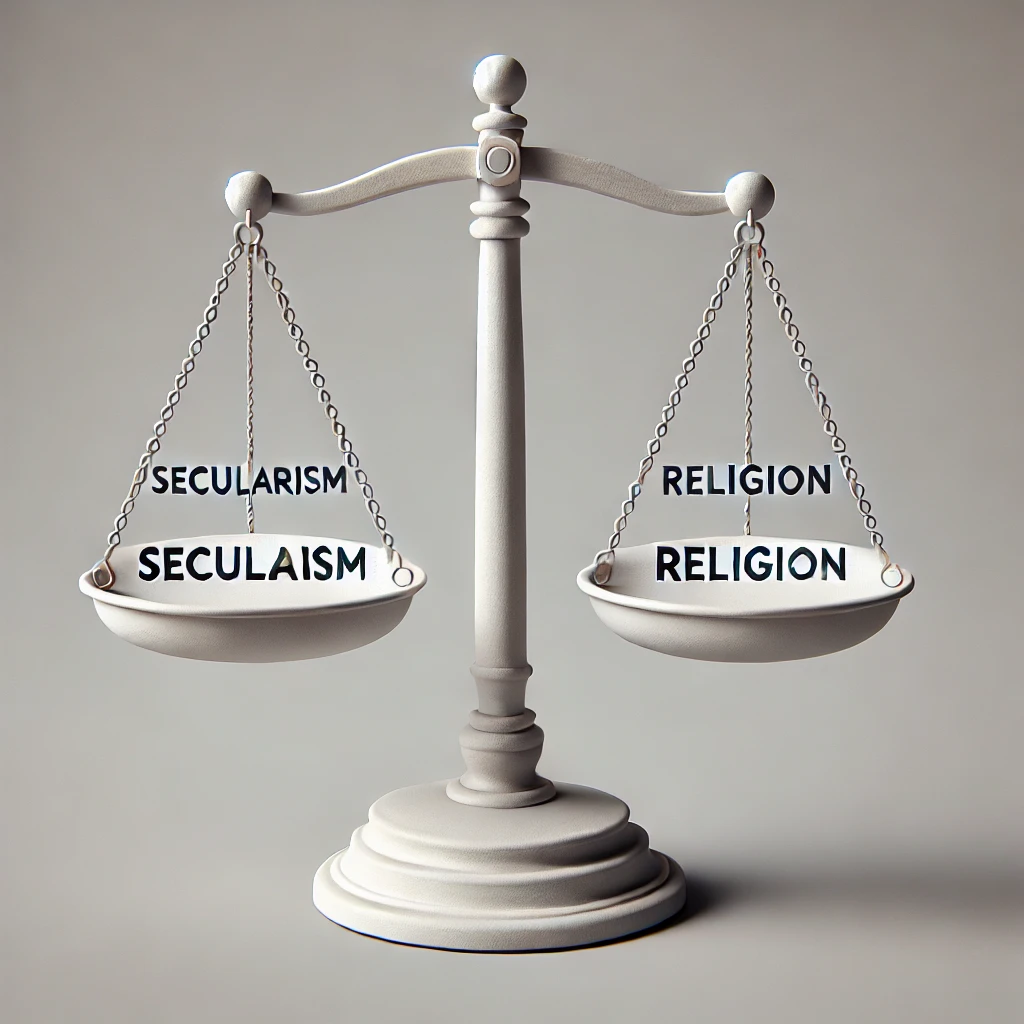
26
25The Paradox of Secularism: Neutrality, Supremacy, and the Rise of a New Religious Order
Secularism is often
lauded as the ideological framework that ensures neutrality in pluralistic
societies. By ostensibly separating religion from the state, it claims to
provide equal footing for all belief systems while protecting civil order.
However, a closer analysis reveals a paradox at the heart of secularism: while
it purports to be neutral, it functions—practically and philosophically—as a
religious system in its own right. Far from being the absence of belief,
secularism often replaces traditional theism with an anthropocentric creed
grounded in human autonomy, reason, and progress.
I. The Myth of
Secular Neutrality
The foundational claim
of secularism is that it offers a neutral platform from which public life can
proceed without the entanglements of religious belief. Yet in practice,
secularism does not simply make space for all worldviews—it delegitimizes those
that do not conform to its epistemological and moral framework.
For example, in
educational settings, religious accounts of human origins, such as creation,
are not merely excluded from science curricula on empirical grounds—they are
dismissed as irrational, unscientific, or premodern. Secularism does not treat
religion as a parallel voice in moral and philosophical discourse; rather, it
renders it obsolete, reducing it to private sentiment or cultural relic. Such
treatment reveals not neutrality but an implicit hierarchy of knowledge in
which the secular worldview is granted epistemic supremacy.
II. Secularism as a
Meta-Religion
Secularism’s rejection
of divine authority does not lead to a vacuum of belief. Instead, it replaces
the divine with the human. In this sense, secularism functions as a
“meta-religion”—one that disavows its religious character while espousing
metaphysical commitments of its own. It upholds faith in human rationality,
moral progress, scientific enlightenment, and the capacity of human
institutions to secure meaning, justice, and order.
This human-centered
orientation is not merely anthropological—it is theological. The shift from Deus
to homo in secular reasoning is not a neutral realignment but a
confessional one. In rejecting the transcendent, secularism enthrones the
immanent. The human mind becomes the ultimate arbiter of truth, and the state
becomes the moral compass of the public square.
Rather than
maintaining a space of ideological plurality, secularism often displays what
can be called a “colonizing tendency.” It seeks not merely to remove religion
from public institutions but to redefine those institutions in accordance with
secular assumptions. This can be observed in the way public education, legal
systems, and policy frameworks increasingly reflect values rooted in secular
humanism.
Students are not
exposed to religion as a viable epistemic framework but as a cultural or
historical curiosity. Courts often interpret religious expressions through
secular lenses, reducing deeply held beliefs to subjective preferences. Even
artistic and media representations of faith are often filtered through a
secular worldview that casts religion as oppressive, regressive, or irrational.
This tendency to
reinterpret or silence religion is not simply a protective measure—it is an
assertion of dominance. It reveals that secularism does not simply desire
freedom from religion; it seeks freedom from the influence of religion.
IV. The Parasitic
Origins of Secular Morality
Another irony worth
noting is that secularism often emerges in societies that were historically
shaped by robust religious traditions, particularly Christianity or Islam. The
moral vocabulary of secularism—human rights, dignity, equality, compassion—was not
born in a vacuum. It is derived, at least in part, from the theological and
moral foundations laid by the very religions secularism seeks to marginalize.
Secular ethics borrows
heavily from religious capital while simultaneously denying the metaphysical
basis that makes such ethics coherent. It cuts off the root, while attempting
to preserve the fruit. In this sense, secularism is not self-sustaining; it is
parasitic, drawing life from the moral imagination of the faiths it supplants.
V. The Inevitable
Religious Turn
Because secularism
demands public loyalty to a particular moral and epistemological framework, it
inevitably functions as a religion—even if it denies that designation. It has
its doctrines (scientific materialism, liberal individualism), its rituals (commemorations
of progress, civic ceremonies), its taboos (religious expressions in public
institutions), and its eschatology (a future guided by human enlightenment and
social evolution).
What is most
paradoxical is that secularism, in its attempt to rid the public square of
religion, becomes religious itself. It sets itself up as the final moral
authority, resistant to critique from traditional faiths. Its claim to
neutrality thus becomes not only implausible but disingenuous. It does not
stand beside other faiths; it stands against them.
If we are to live in
truly pluralistic societies, then secularism must be examined not only as a
political arrangement but as a cultural and theological project. The assumption
that it offers a neutral space must be challenged. Secularism does not simply
mediate between competing religious claims; it competes with them.
In light of this,
societies must ask hard questions: Can secularism be self-critical about its
own dogmas? Can it acknowledge its dependence on the moral resources of
religion? And can it make space—not merely tolerate, but genuinely make
space—for other visions of the good, the true, and the beautiful?
Unless these questions
are asked and answered, secularism will continue to pose as neutral while
functioning as a rival religion—one that cloaks itself in the language of
reason, but ultimately demands faith in man.






(0) comments